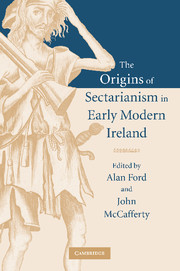Book contents
- Frontmatter
- Contents
- Preface
- List of contributors
- List of abbreviations
- 1 Living together, living apart: sectarianism in early modern Ireland
- 2 Confessionalisation in Ireland: periodisation and character, 1534–1649
- 3 Protestant prelates or godly pastors? The dilemma of the early Stuart episcopate
- 4 ‘In imitation of that holy patron of prelates the blessed St Charles’: episcopal activity in Ireland and the formation of a confessional identity, 1618–1653
- 5 A haven of popery: English Catholic migration to Ireland in the age of plantations
- 6 The Irish historical renaissance and the shaping of Protestant history
- 7 Religion, culture and the bardic elite in early modern Ireland
- 8 The political and religious thought of Florence Conry and Hugh McCaughwell
- 9 Sectarianism: division and dissent in Irish Catholicism
- 10 Purity of blood and purity of faith in early modern Ireland
- 11 Concluding reflection: confronting the violence of the Irish reformations
- Index
3 - Protestant prelates or godly pastors? The dilemma of the early Stuart episcopate
Published online by Cambridge University Press: 24 November 2009
- Frontmatter
- Contents
- Preface
- List of contributors
- List of abbreviations
- 1 Living together, living apart: sectarianism in early modern Ireland
- 2 Confessionalisation in Ireland: periodisation and character, 1534–1649
- 3 Protestant prelates or godly pastors? The dilemma of the early Stuart episcopate
- 4 ‘In imitation of that holy patron of prelates the blessed St Charles’: episcopal activity in Ireland and the formation of a confessional identity, 1618–1653
- 5 A haven of popery: English Catholic migration to Ireland in the age of plantations
- 6 The Irish historical renaissance and the shaping of Protestant history
- 7 Religion, culture and the bardic elite in early modern Ireland
- 8 The political and religious thought of Florence Conry and Hugh McCaughwell
- 9 Sectarianism: division and dissent in Irish Catholicism
- 10 Purity of blood and purity of faith in early modern Ireland
- 11 Concluding reflection: confronting the violence of the Irish reformations
- Index
Summary
Two texts, one scriptural, one historical, have been applied to the Church of Ireland bishops of the early seventeenth century. The first is St Paul on the question of atonement, often appropriated to the episcopal office. ‘And who’, he says, ‘is sufficient for these things?’ The second is taken from the Annals of the Four Masters for the year 1537: ‘a heresy and new error [sprang up] in England, through pride, vain-glory, avarice and lust … so that the men of England went into opposition to the Pope and Rome … [and] they also appointed archbishops and bishops for themselves’. Paul's depiction of the holy, austere and diligent bishop found above all in his letters to Timothy and Titus enjoyed definitive status in Jacobean England. This image, relayed through biographies, consecration sermons and patristic studies, was the one placed before that first generation of settled Protestants attending the universities in the late 1550s and before their successors. The Four Masters, for their part, offered the first generation of committed recusants the historical proof that these same preaching pastors were mere novelties, sprung from venal and immoral impulses. Their own Roman church presented the people of Ireland with another episcopate which also claimed godliness and scriptural warrant. Vitally these other bishops proclaimed they were no set of innovators. So early modern Ireland saw a particular confrontation – a genuine clash of crosiers.
- Type
- Chapter
- Information
- The Origins of Sectarianism in Early Modern Ireland , pp. 54 - 72Publisher: Cambridge University PressPrint publication year: 2005
- 1
- Cited by



